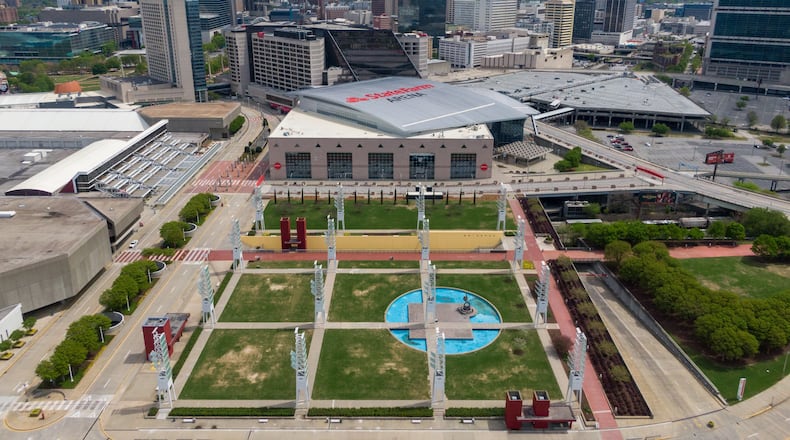Ratings agency Moody's is considering downgrading bonds that back the $200 million renovation of State Farm Arena because of an anticipated steep drop-off in car rental taxes brought on by the coronavirus.
In a letter to investors last week, Moody's said it had placed on review Atlanta's A1 and Aa3 ratings on refunding and 2017 lien series bonds — issued through the Atlanta & Fulton County Recreation Authority — because car rentals, from whose taxes the city has been paying the debt, are in freefall as Americans stay home to avoid spreading the disease.
“The slowdown has the potential to cause some tax revenue tied to hospitality and travel-related activity to decline by up to 85% through mid-summer, potentially driving debt service coverage down significantly,” Moody’s said.
The news, first reported by Channel 2 Action News, could have widespread implications for municipalities throughout the metro area that count on tax collections to pay for expensive arenas and stadiums, including Mercedes-Benz Stadium and Truist Park, experts said. Municipalities in Atlanta and nationally have increasingly used tax collections on car rentals and hotel stays to finance projects.
Atlanta historically has had a strong hospitality business that made it easy to sell car rental taxes as a revenue generator to pay debt, Kennesaw State University economist Roger Tutterow said. The challenge is what to do when the business goes bust.
“There are hotel tax and rental car taxes that are clearly focused upon taking advantage of that hospitality sector,” he said. “That’s been very good for the city when hospitality boomed, but clearly now it’s going to put a little bit of pressure upon municipalities with special projects that are dependent on that.”
Experts said while no one could have anticipated a pandemic that would bring the entire nation’s economy to standstill, those who study the industry at colleges and universities had warned of the risk of too much reliance of sales taxes.
“I hate to say it, the impact of academic folks on policymakers is pretty limited,” said Harvey Newman, a professor emeritus from the Andrew Young School of Policy Studies at Georgia State University who issued such warnings.
Moody's said it will look specifically at the Atlanta Recreation Authority's cash reserves to pay off the debt. The authority, which sold $150 million worth of bonds for the arena to investors and oversees its payments, told Channel 2 investigative reporter Richards Belcher there are no cash reserves.
The city and College Park, where the majority of car rentals are located, collected a combined $14.7 million in car rental taxes in 2019, according to an open records request obtained by Channel 2 from the Atlanta Recreations Authority. About $13 million was paid on the bond payment.
The remaining $1 million went to the Project Coverage Fund, which the authority did not define.
Former Invest Atlanta board member Julian Bene, a frequent critic of taxpayer-sponsored deals, told Channel 2 if Atlanta defaults on the arena bond, it will be investors who take the hit.
“Ultimately someone is going to lose out,” he said, adding better the investors than taxpayers and residents taking it “on the chin.”
About the Author
Keep Reading
The Latest
Featured



